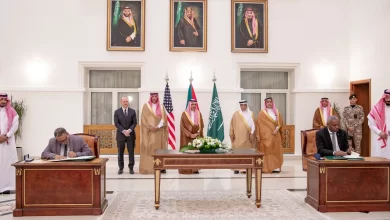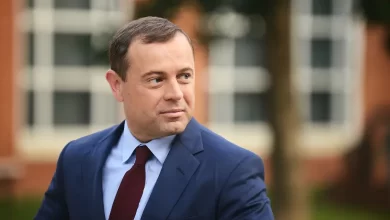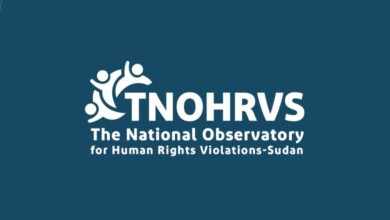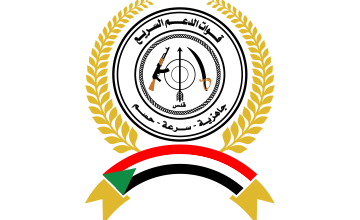Indications of a rift within the Port Sudan Alliance due to power struggles

The lingering differences between the forces loyal to Abdel Fattah Al-Burhan and Al-Baraa Ibn Malik Corps, the military wing of the Muslim Brotherhood, have come to the fore following a dispute between the two sides last week. This came after a statement issued by the Deputy Commander-in-Chief of the Sudanese Armed Forces (SAF), General Shams El-Din Al-Kabbashi, in which he warned against raising any political or military banner other than the military uniform inside combat camps.
The first response to Al-Kabbashi’s statement came from the Commander of Al-Baraa Corps, Almusbah Abuzaid Talha, who spoke in a clear challenge to the leadership of the Port Sudan forces, stating that no one has authority over the Islamist battalions, and that anyone who wishes to confront them should meet them in the field.
Moreover, Almusbah confirmed in a previous speech that they represent the “Shadow Brigades,” which ousted Vice President Ali Osman Mohamed Taha had previously utilized as leverage. This force, affiliated with the Islamic Movement, participated in the killing of demonstrators during the protests of the (December 2018) revolution. It is also accused of being behind the dispersal of the sit-in in front of the Military’s General Command Headquarters in Khartoum, which resulted in the deaths and injuries of hundreds of peaceful young protesters.
According to informed Sudanese sources, a clash between the two sides is only a matter of time. As extremist Islamic elements within the ousted regime’s factions are working to tighten their control over decision-making within both the Port Sudan Forces and the government.
Earlier last April, sources close to the leadership circles of the Port Sudan Forces revealed information regarding profound differences that had emerged from behind closed doors and into the open. This was due to the continued killing and widespread liquidation campaigns against civilians by the “Islamist Militias” in areas where the Port Sudan Forces managed to regain control, as the aforementioned violations were carried out under the pretext of the victims collaborating with the Rapid Support Forces (RSF).
According to sources, some leaders in the Port Sudan forces believe that these extremist groups are seeking to implicate them in further war crimes, which would attract regional and international condemnation for the horrific violations occurring in areas under their control.
A prominent Islamist leader who defected from the organization told (Erem News) that the conflict between Al-Burhan’s forces and the Islamists on the one hand, and the other parties, dubbed the “Rifle Alliance” in the Port Sudan camp, revolves primarily around power, with each side attempting to limit the influence of the other.
He stated that despite the Islamists’ empowerment in Sudan following the (October 2021) Coup, with the complicity of Al-Burhan’s current military leaders, and their clear influence on the course of the war, they are seeking to gain the upper hand in governing the country, that aim includes visions of subordinating the Port Sudan forces to their authority.
In this regard, he pointed to the rising voices driven by the Islamists, objecting to the share of Darfur’s armed militias -the Justice and Equality Movement (JEM) and the Sudan People’s Liberation Movement (SPLM)- which they consider to be a disproportionate share of their participation in the war. These are indicators that could lead to further escalation of disputes between the components of the “Port Sudan Alliance,” which, he added, could further escalate to the level of armed conflict.
The prominent leader, who preferred to remain anonymous, shared that the Port Sudan forces bear primary responsibility for this matter, as they are responsible for the formation and arming of these militias.
However, they will -eventually- be turned against them with the emergence of tribal militias in the east, Al-Jazeera, and the Northern state, which have begun to demand their share of power.
He added that the profound differences within the “Port Sudan Alliance” camp run deep, no matter how hard the parties try to conceal them. Indications of a real split are beginning to emerge on the horizon, a postponed battle that will only bring more conflict and destruction to Sudan.
He warned that the most intense conflict is expected to take place between Al-Burhan’s forces and the Islamists. As Abdel Fattah Al-Burhan has great ambitions to monopolize power after the war ends. However, those dreams don’t align with the agenda of the hardline faction led by Ali Karti, Secretary-General of the Islamic Movement, who is working to restore the deposed regime to full control of the country.
The Islamist leader pointed out that Islamists, unlike other factions, stand as a stumbling block to all initiatives seeking to end the war. As it would possibly lead to permanently removing them from the Sudanese political scene for years to come. Therefore, they will not hesitate to engage in a military confrontation with Al-Burhan’s forces, if necessary. The speaker believes that such a confrontation is inevitable and will lead to the dismantling and end of the rifle alliance in the Port Sudan government camp.
For his part, expert Hatem Elias described the Port Sudan government alliance as a “fragile” bloc built on authoritarian interests, composed of military and civilian groups that have allied with Al-Burhan in order to overthrow the legitimate civilian government led by former Prime Minister Abdullah Hamdok.
He told (Erem News) that the presence of two Darfur Movements —Minni Arcua Minnawi and Jibril Ibrahim— in this alliance falls within their military contracting activities, as they have traditionally employed their fighters as “mercenaries,” in Libya for example. Furthermore, the Port Sudan Alliance includes other militias of a regional and tribal nature that have yet to be tested in any combat.
He added that the Islamists are the primary and organized force controlling the State’s institutions, and that the Commander of the Port Sudan forces, Abdel Fattah Al-Burhan, is part of this group and in no way represents the Sudanese Armed Forces.
Elias went on to share that the Port Sudan Alliance was a product of the current state of war, hence, any successful efforts to implement a ceasefire and achieve peace across the country would be detrimental to the alliance’s continued presence in power.
He emphasized that the Islamists are the group most vehemently opposed to a ceasefire, because the establishment of peace would mean their ultimate demise.
It’s worth noting that the Commander of the Port Sudan forces, Abdel Fattah Al-Burhan, issued a decision a few weeks prior, prohibiting the supply of weapons to allied militias, particularly those affiliated with the Islamic Movement, and limiting them to ammunition supply only.
The decision comes amidst internal and external pressure on Al-Burhan due to the massacres and violations committed against innocent civilians by his forces and those allied with him.





